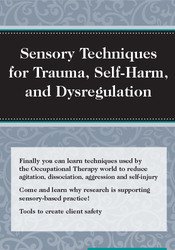

Do you work with clients who become acutely dysregulated and engage in behaviors which present as a danger to self or others leading to a seclusion and/or restraint episode?
Join Brooke Wimer, MOT, OTR/L, who has over 10 years of clinical experience in the field of occupational therapy. She has developed novel programming regarding sensory processing/ modulation to decrease self-injurious behaviors and the utilization of seclusion and restraint.
Brooke will provide an interactive course with hands-on opportunities to:
These interventions are breakthrough techniques to apply with those who have mental health needs and traumatic histories. This workshop will provide you with countless sensory techniques for use in crisis situations and ongoing symptom management. This trauma-informed approach offers client-centered tools for feeling safe; sensory modulation techniques allow clients to direct their care by exploring and selecting modalities that work for them.
This online program is worth 6.5 hours CPD.
| File type | File name | Number of pages | |
|---|---|---|---|
| Manual ZNM063340 (39.32 MB) | 151 Pages | Available after Purchase |
Brooke Wimer, MOT, OTR/L, is an occupational therapist with over 11 years of clinical experience providing Animal-Assisted Interventions (AAI) with a variety of populations. She is the co-owner of Integrated Occupational Therapy Solutions, a private practice offering AAI and occupational therapy services. Brooke specializes in providing AAI for people with mental health needs focusing on cognitive retraining, social skill development and self-regulation. She has implemented five AAI programs for physical, cognitive and psychosocial needs, and developed effective strategies for both group and one-to-one interventions for clients of all ages. Brooke worked alongside AAI expert Melissa Winkle, OTR/L, FAOTA, and contributed to Professional Applications of Animal Assisted Interventions: Blue Dog Book Second Edition. A member of the American Occupational Therapy Association (AOTA), she is co-developing an AOTA Animal Assisted Intervention Fact Sheet set to publish in 2018. Brooke presented on disability awareness and AAI application considerations at the 2015 Animal Assisted Intervention International Conference. She received her Master of Occupational Therapy at Cleveland State University, studying the effects of AAI on long-term care residents with depression and anxiety.
Speaker Disclosure:
Financial: Brooke Wimer is the director of occupational therapy and animal assisted intervention manager at Colorado Mental Health Institute at Pueblo. She receives a speaking honorarium from PESI, Inc. Brooke has no relevant financial relationships with ineligible organizations.
Non-financial: Brooke Wimer is a member of the American Occupational Therapy Association.
Trauma’s Effect on the Brain and Nervous System
Seclusion and Restraint – Current Practices
Assessment Tools
Clinical Outcomes using Sensory Strategies
Sensory Strategies for Regulating!
Satisfaction Guarantee
Your satisfaction is our goal and our guarantee. Concerns should be addressed to info@pesi.co.uk or call 01235847393.
Please wait ...